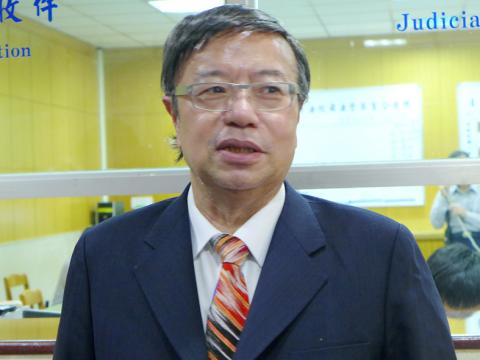The Chinese Nationalist Party (KMT) has announced it has resumed its legal battle against Legislative Speaker Wang Jin-pyng (王金平), a KMT source said yesterday, and has appealed against a Taipei District Court ruling that allowed Wang to retain his party membership.
After taking advice from lawyers, as well as considering the long-term future of party policy, the KMT has been left with no alternative but to appeal, the source said, adding that the decision was made out of consideration for party rules and discipline.
The source said the KMT questions the rationale behind the Taipei District Court ruling on March 19, which said that for an individual to be stripped of their party membership, a conference of national delegates must be held in which at least half of the total number of delegates must be in attendance and more than two-thirds of these must agree on the action.

Photo: CNA
The KMT is a political party and cannot be viewed as an ordinary civic organization, the party source said, adding that the court ruling would mean previous individuals with revoked memberships would be able to claim that the party’s disciplinary committee’s decisions were invalid.
The source said this could have dramatic repercussions.
The source cited concern for the year-end “seven-in-one” local elections if individuals not nominated by the KMT decide to contest the effectiveness of party discipline and run in the elections.
The KMT has another five days to lodge its appeal in the Wang case.
The court — in deciding in Wang’s favor — had rejected the party disciplinary committee’s authority after the KMT stripped Wang of his party membership in September last year for allegedly using his influence to sway decisions in a legal case.
At the time, President Ma Ying-jeou (馬英九) said that Wang had brought “shame on Taiwan’s judiciary and democratic history,” while also trying to remove him from the post of legislative speaker.

Taiwan is projected to lose a working-age population of about 6.67 million people in two waves of retirement in the coming years, as the nation confronts accelerating demographic decline and a shortage of younger workers to take their place, the Ministry of the Interior said. Taiwan experienced its largest baby boom between 1958 and 1966, when the population grew by 3.78 million, followed by a second surge of 2.89 million between 1976 and 1982, ministry data showed. In 2023, the first of those baby boom generations — those born in the late 1950s and early 1960s — began to enter retirement, triggering

ECONOMIC BOOST: Should the more than 23 million people eligible for the NT$10,000 handouts spend them the same way as in 2023, GDP could rise 0.5 percent, an official said Universal cash handouts of NT$10,000 (US$330) are to be disbursed late next month at the earliest — including to permanent residents and foreign residents married to Taiwanese — pending legislative approval, the Ministry of Finance said yesterday. The Executive Yuan yesterday approved the Special Act for Strengthening Economic, Social and National Security Resilience in Response to International Circumstances (因應國際情勢強化經濟社會及民生國安韌性特別條例). The NT$550 billion special budget includes NT$236 billion for the cash handouts, plus an additional NT$20 billion set aside as reserve funds, expected to be used to support industries. Handouts might begin one month after the bill is promulgated and would be completed within

NO CHANGE: The TRA makes clear that the US does not consider the status of Taiwan to have been determined by WWII-era documents, a former AIT deputy director said The American Institute in Taiwan’s (AIT) comments that World War-II era documents do not determine Taiwan’s political status accurately conveyed the US’ stance, the US Department of State said. An AIT spokesperson on Saturday said that a Chinese official mischaracterized World War II-era documents as stating that Taiwan was ceded to the China. The remarks from the US’ de facto embassy in Taiwan drew criticism from the Ma Ying-jeou Foundation, whose director said the comments put Taiwan in danger. The Chinese-language United Daily News yesterday reported that a US State Department spokesperson confirmed the AIT’s position. They added that the US would continue to

IMPORTANT BACKER: China seeks to expel US influence from the Indo-Pacific region and supplant Washington as the global leader, MAC Minister Chiu Chui-cheng said China is preparing for war to seize Taiwan, Mainland Affairs Council (MAC) Minister Chiu Chui-cheng (邱垂正) said in Washington on Friday, warning that Taiwan’s fall would trigger a regional “domino effect” endangering US security. In a speech titled “Maintaining the Peaceful and Stable Status Quo Across the Taiwan Strait is in Line with the Shared Interests of Taiwan and the United States,” Chiu said Taiwan’s strategic importance is “closely tied” to US interests. Geopolitically, Taiwan sits in a “core position” in the first island chain — an arc stretching from Japan, through Taiwan and the Philippines, to Borneo, which is shared by